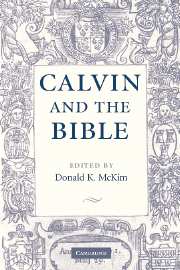Book contents
- Frontmatter
- Contents
- Notes on contributors
- Preface
- List of abbreviations
- 1 Calvin as commentator on Genesis
- 2 Calvin as commentator on the Mosaic Harmony and Joshua
- 3 Calvin as an interpreter of Job
- 4 Calvin as commentator on the Psalms
- 5 Calvin as commentator on the Prophets
- 6 Calvin as commentator on the Synoptic Gospels
- 7 Calvin as commentator on the Gospel of John
- 8 Calvin as commentator on the Acts of the Apostles
- 9 Calvin as commentator on the Pauline epistles
- 10 Calvin as commentator on Hebrews and the Catholic Epistles
- 11 John Calvin as an interpreter of the Bible
- Index
Preface
Published online by Cambridge University Press: 09 November 2009
- Frontmatter
- Contents
- Notes on contributors
- Preface
- List of abbreviations
- 1 Calvin as commentator on Genesis
- 2 Calvin as commentator on the Mosaic Harmony and Joshua
- 3 Calvin as an interpreter of Job
- 4 Calvin as commentator on the Psalms
- 5 Calvin as commentator on the Prophets
- 6 Calvin as commentator on the Synoptic Gospels
- 7 Calvin as commentator on the Gospel of John
- 8 Calvin as commentator on the Acts of the Apostles
- 9 Calvin as commentator on the Pauline epistles
- 10 Calvin as commentator on Hebrews and the Catholic Epistles
- 11 John Calvin as an interpreter of the Bible
- Index
Summary
A common perception of John Calvin (1509–1564) is that he was a rigid logician and systematic theologian of the Reformation period. While it is true that Calvin presented Christian theology in a more organized or “systematic” form than Luther, it is also true that there is much more to his theological understandings than is found within the pages of his magnum opus, the Institutes of the Christian Religion.
The past several decades have focused more attention on Calvin's biblical interpretation as found in his commentaries. A growing number of scholars have now contributed to the increasing recognition of the importance of studying Calvin's interpretive work as a commentator on Scripture. To recognize the issues, conversations, questions, and conclusions Calvin drew from his exegetical work on virtually all biblical books is to gain a much wider and deeper appreciation for the nature of his biblical and theological understandings than has been possible before. Scholars will continue to reflect on the relation of Calvin's interpretation of biblical texts to the development of his theology as a whole. But an appreciation of his exegetical labors and his work as a biblical commentator is now recognized as a key element in Calvin scholarship.
This book provides a study of Calvin as a biblical interpreter and commentator on Scripture. The following chapters are written by Calvin specialists who have studied Calvin as an interpreter of the major portions of Scriptures represented here.
- Type
- Chapter
- Information
- Calvin and the Bible , pp. xi - xiiPublisher: Cambridge University PressPrint publication year: 2006

